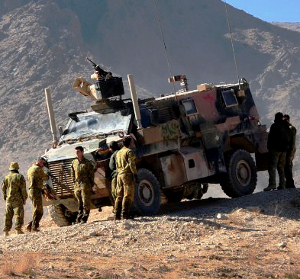Issues raised in Asian defence technology trades
 There has been plenty of discussion on the terms of the free trade agreement between Australia and Japan, which will see the lucrative exchange of multi-billion dollar military technologies.
There has been plenty of discussion on the terms of the free trade agreement between Australia and Japan, which will see the lucrative exchange of multi-billion dollar military technologies.
But the deals now signed with Japan and Korea include comparable levels of defence co-operation, and with similar links expected in the upcoming deal with China, Australia risk placing itself in the middle of a multi-faceted defence stand-off.
The recently-signed deals with Japan and Korea include a defence technology and equipment partnership, which has been set up to facilitate the development of innovative military science, including the likely exchange of next-generation weapons between the nations.
The deal has raised some eyebrows internationally, with concern from China about Australian, Korean and Japanese intentions in increasing their security and military links.
Prime Minister Tony Abbott says the defence forces were already co-operating on occasional exercises, and that Japan had previous purchased a number of Australian Bushmaster military vehicles.
“We want to see more inter-operability between our militaries, we want to see more exercises between our militaries, we want to see over time more significant intelligence co-operation,” he told ABC Radio.
“It’s not against any specific country and as far as I am concerned - as far as just about every country is concerned - what we want to see is more democracy, more freedom, more respect for the rule of law.”
He says he wants the separate relationships with Japan and China not to play into, or be involved with tensions between the two themselves.
China’s issued are understood to have been stirred when Mr Abbott was invited to attend a meeting of Japan's National Security Council in Tokyo, an unprecedented step which no other foreign leader has been allowed to do.
“We say there should be no change to the status quo, which is brought about by force or by the threat of force,” Abbott said afterward.
Commentators say that Japan has been given Australia’s imprimatur to continue its controversial path of growing its military capacity and strength, potentially transitioning from officially pacifist to a more assertive stance.
After the official announcement of the deal, Japanese Prime Minister Shinzo Abe was much more willing to speak about the defence deal than Tony Abbott appeared.
“In the field of security, we decided to commence negotiations towards a framework agreement for corporation in the area of defence, equipment and technology,” Mr Abe said after their talks.
“Furthermore, it was confirmed that the inter-operability between the defence organisations of the two countries will be improved so that practical co-operation between our two countries; including combined defence training can further be expanded in a strategic manner ... both Japan and Australia will continue to work together towards our common goals such as realising peace and stability in the region as well as the international community and establishing respect for the rule of law over our oceans and airspaces.”
The two prime ministers noted in a joint communiqué that “the two countries’ complementary strengths and shared interests in co-operation on defence science, technology, and equipment and decided to commence negotiations toward a framework agreement in this field”.
With regard to the Korean agreement, Mr Abbott said; “I wanted to assure [South Korean] President Park that we were interested in defence cooperation beyond the long established security cooperation, including defence procurement, and I think she was very happy to have that assurance”.
“It is important that we swiftly resume defence procurement cooperation and I want to explore what’s possible in this area in the week and months ahead.”








 Print
Print